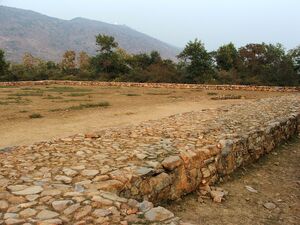Bimbisara
| Author:Laxman Burdak, IFS (R) |

Bimbisara, (बिम्बिसार, 558 BC—491 BC)[1][2] (Bimbisar) was a king of the Magadha empire from 543 BC to his death and belonged to the Hariyanka dynasty.[3]
Career
There are many accounts of Bimbisara in the Buddhist Jatakas, since he was a contemporary of Gautama Buddha. He acquired Anga and placed it under the vice royalty of his son Ajatashatru, with its capital at Champa. King Bimbisara met Buddha for the first time when Buddha wasn't enlightened yet, and later became an important disciple of Buddha. He is recorded to have attained sotapannahood, a degree of enlightenment in Buddhist teachings.
As per Jainism texts, he is referred to as King Shrenik of Rajgrih.
Marriage alliances
Bimbisara used marriage alliances to strengthen his position. His first wife was Kosala-devī, the daughter of Mahā Kosala the king of Kosala, and a sister of Prasenjit. His bride brought him Kashi, which was then a mere village, as dowry.[4] This marriage also ended the hostility between Magadha and Kosala and gave him a free hand in dealing with the other states. Bimbisara's second wife, Chellana, was a Lichchhavi princess from Vaishali.[5] His third wife was a daughter of the chief of the Madra clan of Punjab.[6]
Death
Tradition tells us that Bimbisara was imprisoned by his son Ajatashatru who is said to have starved him to death. This is reported to have taken place around 491 BC.[3]
Notes
- ↑ Rawlinson, Hugh George. (1950) A Concise History of the Indian People, Oxford University Press. p. 46.
- ↑ Muller, F. Max. (2001) The Dhammapada And Sutta-nipata, Routledge (UK). p. xlvii. ISBN 0-7007-1548-7.
- ↑ Jump up to: 3.0 3.1 Stearns, Peter N. (2001) The Encyclopedia of World History, Houghton Mifflin. pp. 76-78. ISBN 0-395-65237-5.
- ↑ Eck, Diana. (1998) Banaras, Columbia University Press. p. 45. ISBN 0-231-11447-8.
- ↑ Luniya, Bhanwarlal Nathuram. (1967) Evolution of Indian Culture, Lakshmi Narain Agarwal. p. 114.
- ↑ Krishna, Narendra. (1944) History of India, A. Mukherjee & bros. p. 90.
Back to The Ancient Jats

